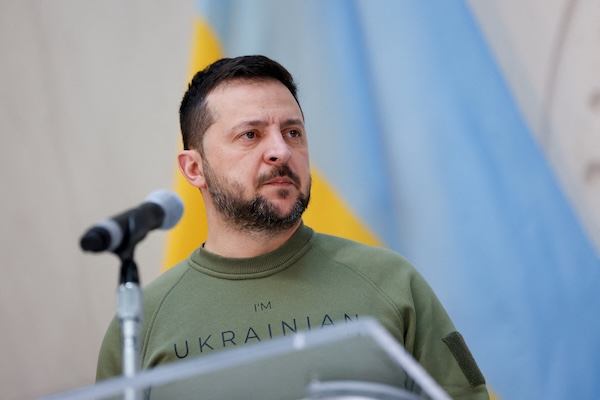 Ukraine's President Volodymyr Zelensky speaks to the press in Washington, US, 11 December 2023;
Credit: Reuters/Julia Nikhinson/File Photo
Ukraine's President Volodymyr Zelensky speaks to the press in Washington, US, 11 December 2023;
Credit: Reuters/Julia Nikhinson/File Photo
PARIS (Reuters) - Some 30 leaders will hold talks on Thursday 4 September 2025 with Ukrainian President Volodymyr Zelensky over future security guarantees to Kyiv if there is a ceasefire with Russia, hoping they have done enough to persuade the United States to back their efforts.
The summit, both in person and virtually, of the "coalition of the willing" brings together leaders mostly from Europe, but also Turkey, Australia and Canada.
The countries have talked for months at various levels to define their military contributions to Ukraine to help deter Russia from attacking it again once there is a final truce.
But those efforts have stalled recently as governments have said any European military role would need its own US security guarantees as a backstop. President Donald Trump has made no explicit commitment to provide those.
French President Emmanuel Macron said alongside Zelensky in Paris on Wednesday 3 September 2025 that the coalition leaders would endorse plans on Thursday for security guarantees completed by their militaries.
Two European officials said the detailed “technical” plans had been finished without going into detail on what that actually meant.
"We are ready, us Europeans, to provide security guarantees to Ukraine," Macron said. "It enables us to say solidly that we are ready for a robust peace for Ukraine and Europeans, but the question now is to see the sincerity of Russia."
The two European officials said the aim would be to send a political signal to Trump. This would highlight the lack of progress toward direct peace talks between Russian President Vladimir Putin and Zelensky since a Trump-Putin summit in August and prod Trump to raise pressure on Moscow now.
The British and French army chiefs, who held detailed meetings last week with coalition counterparts, were due to brief leaders on Thursday, according to a concept note sent to attendees seen by Reuters.
NATO Secretary General Mark Rutte said on Wednesday he expected clarity on what could be delivered soon.
"That means that we can engage even more intensely, also with the American side, to see what they want to deliver in terms of their participation in security guarantees," Rutte told reporters at a news conference.
Illusory peace
Putin told Kyiv on Wednesday there was a chance to end the war in Ukraine via negotiations "if common sense prevails", an option he said he preferred but he was ready to end it by force if that was the only way.
Western officials say the most important element of the guarantees will be continuing strong support for the Ukrainian armed forces. But they were also expected to include an international force to assist and reassure Kyiv both in Ukraine and in neighbouring countries.
A French official briefing reporters declined to say what countries were ready to contribute to Ukraine's security guarantees including to the reassurance force.
European leaders have made clear such a force will only be feasible with US backing - something Trump promised last month in general terms. But Washington has yet to spell out what it is willing to contribute.
US special envoy Steve Witkoff was due in Paris on Thursday, two diplomatic sources said. Some leaders will call Trump after the summit, the French presidency said.
John Foreman, a former British defence attache to Kyiv and Moscow, said it was important for the leaders to understand exactly what is on offer especially for Zelensky as he weighs his country’s position ahead of any direct talks with Russia.
"That said, there is growing realisation that peace will require a strong Ukraine and Ukrainian army, that European support will need to be long-lasting, and that Ukraine probably can’t rely on its allies coming to its aid and punish Russia should it re-attack," he said.
"This is all prep work for a peace which remains illusory and remote due to Trump’s incoherent diplomacy and the lack of substantive talks."








